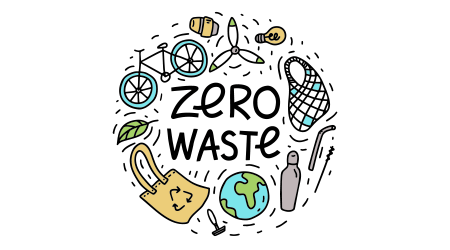Why Bother?
Living a Zero Waste lifestyle is the crowning achievement of any environmental activist. However, Zero Waste certainly comes with several challenges; it’s hard work. Regardless, even doing SOME of the tips below can allow you to reduce the amount of waste you put out, and still feel good about it too.Bea Johnson’s Five R’s
You’ve probably heard of the Three R’s: Reuse, Reduce, Recycle. While this phrase is not completely useless, it does not quite capture the essence of what a Zero Waste lifestyle is all about. Bea Johnson, in her novel Zero Waste Home: The Ultimate Guide to Simplifying Your Life by Reducing Your Waste, added two additional R’s to the infamous phrase: Refuse and Rot.
Refuse is simple enough. We consume so much waste, and we often do not think about what happens following our consumption. For example, most food wrappers on fast food will end up in landfills, due to being non-recyclable (and non-compostable, but more on that later). Thus, the only way to avoid having that type of waste end up in landfills is to, well, avoid it entirely. Cutting fast food from your diet may not be something you want to do. Dine-in restaurants can satisfy the role of fast food equally as well, and do not necessarily require that you create waste in the process. Learning to cook can also potentially satisfy the urge to purchase fast food. After all, some say the food you make is better than the food you purchase!
The second R tends to be a little more complex. Rot refers to food scraps rotting and turning into compost; compost is then used to fertilize soul, which is especially useful if you or your family owns a garden. Now, composting is not necessarily something most people have time for, nor is it something all people need. For those who do not garden to any extent, there are still other ways to deal with rot. Collecting food scraps in your refrigerator in an airtight, reusable container is still a very good way to eliminate food waste. At the end of the week, you can take the container to a composting facility near you. In Philadelphia, there are several locations that accept and process compost so that you do not have to. We have included several links below to help you find a composting site near you!

Why Bother?
Reusing is not about taking old waste and reusing it for something else or for its initial purpose. Reusing is all about finding reusable items for common objects. Bamboo or wooden utensils, metal straws, cotton dish towels, and reusable grocery bags are arguably the most important items that prevent any further waste from being accumulated. Reusable water bottles are a huge one, since plastic bottles are such a blight on our environment. For coffee lovers, reusable coffee filters or biodegradable ones can be substituted for single use pods. There are hundreds of examples for reusable alternatives, so listing all of them here would be extremely redundant. Instead, we have provided some various links below to help you start buying reusable alternatives. For when zero waste is not possible, recycling is still a wonderful alternative. Following all the rules of recycling can ensure that, even when you are creating waste, the waste you DO create is being potentially repurposed into something else. There are always ways to reduce and sustain your waste output; all you have to do is look.
